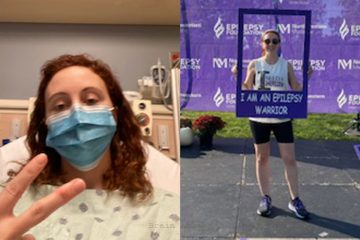I love words. I find it interesting how our chosen lifestyles, our culture/religion, our environment and what life throws at us creates the landscape of our individual vernacular. I love the fascinating way children learn language, how their interests drive their ever growing vocabulary. I’m not good at learning new languages but I love learning new interesting words in languages other than English. Playing word games with my family is fun, seeing how our interests impact our word usages. How pop culture oozes in, how our interest in farming and ecology shows up in every Bananagrams game. I remember being intrigued by medical anatomy words at 12 years old when I first had knee issues, I mean meniscus is just a cool word.
I knew the words epilepsy, seizure, and neurologist before I was diagnosed with epilepsy but they weren’t part of my daily vocabulary. Since then, learning the language of epilepsy has helped me understand my disease. Aura is a beautiful word even though the event is scary. Many world religions have prayers, chants and meditations that focus on one word, sometimes even one letter. when I have auras, sometimes just saying out loud “I am having an Aura” and repeating it to myself and focusing on the word Aura seems to help bring me out of it.
Learning that neurons misfiring is the start of seizures brought me to want to understand more about neuroscience in general. We all learn early on about EEG, electroencephalogram, which is simply and beautifully Latin for “electric brain recording”. A newer word on the scene is epileptologist, which I think started to be used in 2010. I enjoy learning the building blocks of these words that define and describe my disease. I am glad the future holds new words for me to learn.
I recently learned the term ideophones, here’s what it says on the Wikipedia page: “Ideophones are words that evoke an idea in sound, often a vivid impression of certain sensations or sensory perceptions. e.g. sound (onomatopoeia), movement, color, shape, or action.” They are also described as “vivid sensory words.” The word postictal in general is fascinating to me but wow… I realized it’s an ideophone. Postictal to me does evoke the feeling I experience after a seizure; post- Latin for after… that feeling of waking up and knowing something has happened in the near past, ict… that icky icky cobwebby seizure feeling, al… these feelings are ALL consuming. The BIG AFTER ICKY is ALL of me. Although even with my postictal experiences I find myself loving this word. It is a perfect word for an awful feeling, an awful experience.
I did feel a bit worried when I first learned the phrase postictal psychosis. After asking an epilepsy researcher to explain it to me, understanding the basics of this lessened my worry.
The word aphasia, from Greek for “speechless,” is another beautiful word. Many of us with epilepsy experience anomic aphasia, also called dysnomia, I do. I have issues with expressive speech and word retrieval sometimes when I am having an aura or a migraine, when I am postictal, when I have neuro fatigue and sometimes from medication side effects. I am 51 years old and it’s hard not to be concerned my aphasia might get worse as I age but again just knowing the name for this, and learning about it lessens my worry.
I recall during the mid or late 90‘s when there was a movement in the epilepsy community that the word “Epilepsy” held so much stigma the name should officially be changed to “seizure disorder.” I think the official name of my diagnosis has changed three times since my diagnosis in 1991, even though my seizure pattern and EEG has remained the same. I remember push back from large organizations to keep the official name Epilepsy. I am glad there is now a positive reclaiming of the words epilepsy and epileptic by our community.
Words have power. Some say “don’t identify with your diagnosis” but if we don’t accept our names, how can we know ourselves, and love ourselves wholly. People who were undiagnosed and faced years of not knowing the name of what they have often feel great relief at finally having a Name. Central characters “true names” are used as powerful plot devices in folklore, fairy tales and fantasy fiction.
Epilepsy is often described as an illness with “sudden and recurrent neurological episodes.” The lives of people with epilepsy can feel out of our control, the sense of impending doom can be overwhelming at times. For me, the more I understand the science of Epilepsy the more I feel a semblance of agency. The origin of the word seizure is usually listed as “take hold of.” I found another origin for the word seize on an online etymology dictionary, “to grasp with the mind.” I am endeavoring to grasp with my mind my epilepsy in hopes that my epilepsy will take hold of my mind as little as possible.
Photo of Epilepsy entry text in The Compact Edition of the Oxford English Dictionary 1971
© 2020 Yarrow Rubin All Rights Reserved


